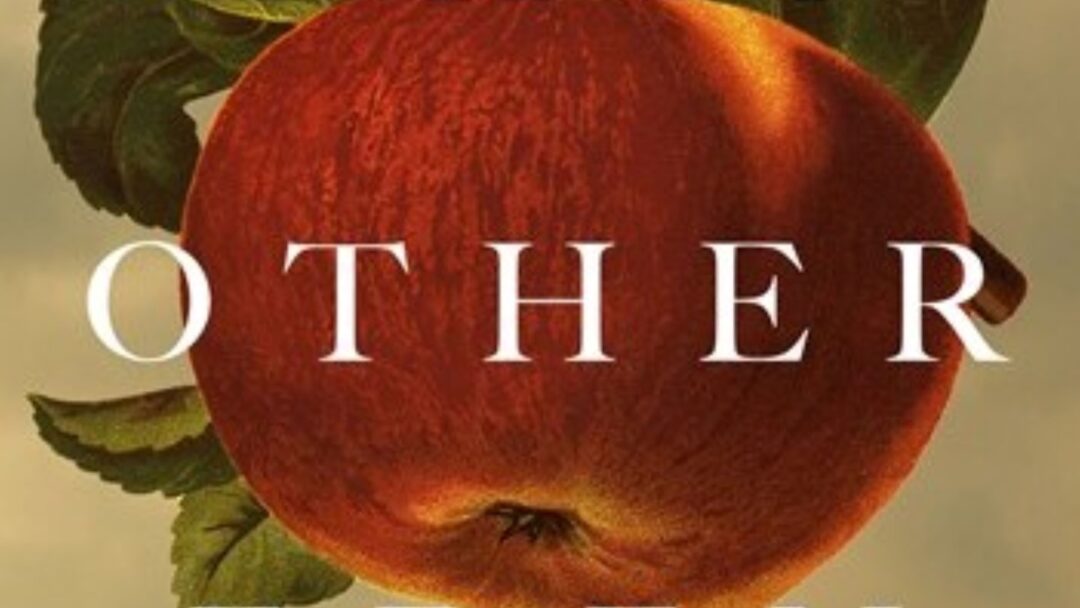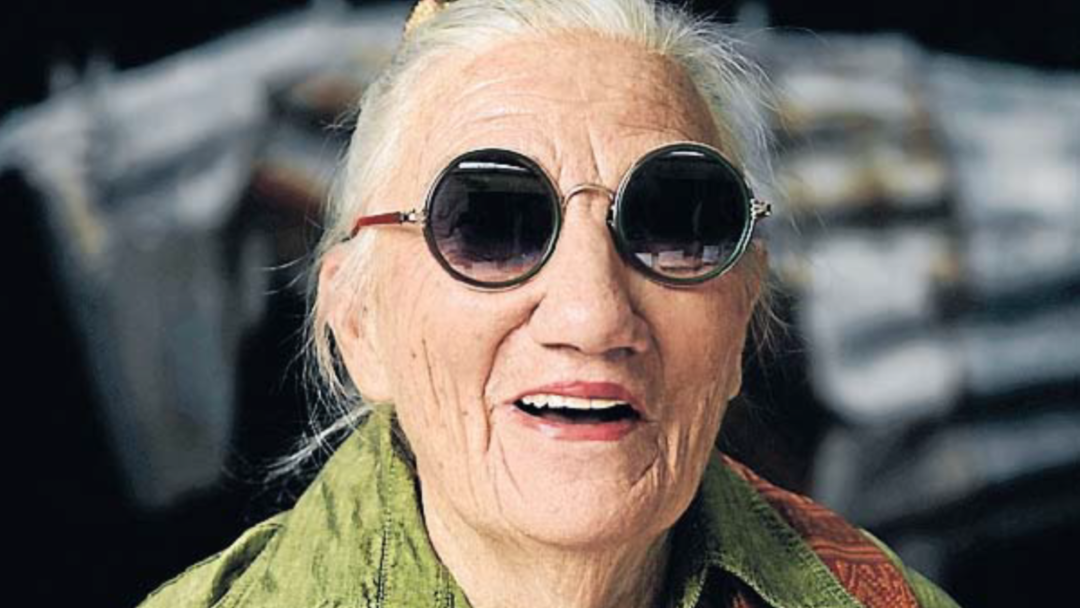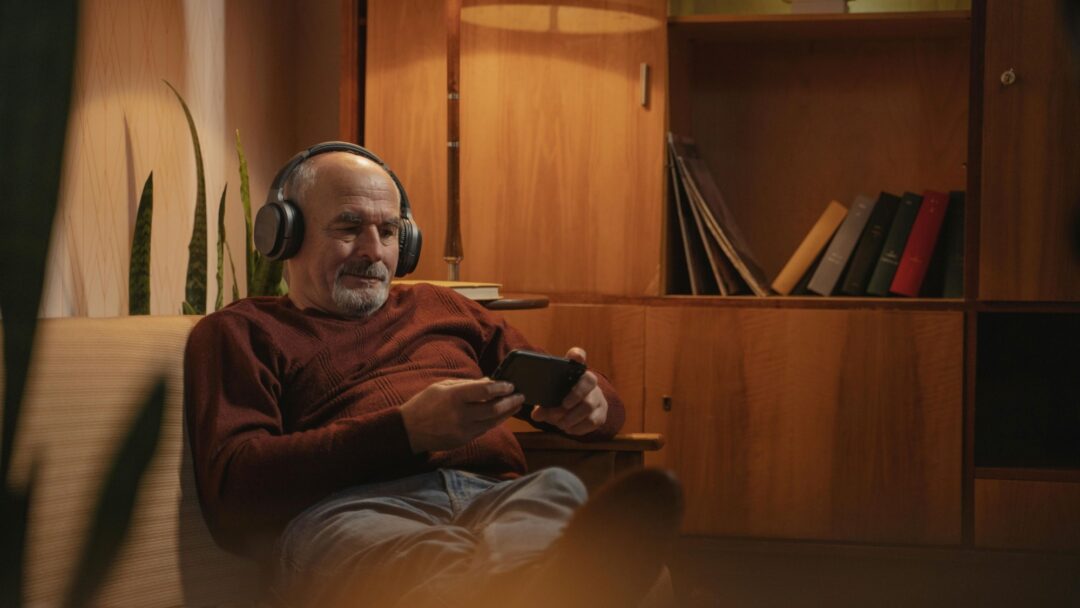Audio
From Australian thrillers to the US and South Africa
Hear This by
Vision Australia3 seasons
1 November 2024
28 mins
Reviews and readings from books available in the Vision Australia Library.

From the Vision Australia library of publications accessible to people with blindness or low vision comes this weekly series of programs.
Host Frances Keyland presents reviews, selected readings and reader recommendations.
This edition opens with two Australian mysteries, then moves to works set in the USA and South Africa.
The picture on this page shows part of the cover of the Anna Downes novel Red River Road, featured in this program.
00:30 UU (PROGRAM THEME)
Let's. Take a look. To take a look inside the book. Take a look...
00:49 S1
Hello and welcome to Hear This. I'm Frances Keyland, bringing you the Vision Australia Library radio show about Vision Australia Library and the books that it contains. Or some of them at least. And today we've got some samples of a few of the over 40,000 titles that are in the library. And I hope you enjoy the show.
Let's start off today's show with a good Australian mystery set in the outback. This is Red River Road by Anna Downes. On the coral coast of Western Australia, solo traveller Katie is on a mission to find her free spirited sister Phoebe, who disappeared along the same route a year ago. But as she drives her camper van further into the Wild North, Katie realizes she's not as alone as she'd first believed. Soon, she is pulled into a complicated web of secrets, lies, myths and stories that force her to question everything she thought she knew about her sister. Let's hear a sample of Red River Road by Anna Downes. It's narrated by Maddy Withington.
01:55 S2
I've made a mistake. I know it as soon as I catch my head lolling, my eyelids drifting shut with a sharp inhale, I sit up straight and tighten my grip on the wheel. I blink and the road swims back into focus. Dusty asphalt passes beneath me like fast running water. The broken white line shining in the twin beams of my headlights on both sides. Red dirt fades to black. My heart starts to race. Did I just fall asleep? I checked the speedometer. I'm almost 20. Over the limit. God damn. Swiping a hand across my clammy brow. My foot finds the brake and the van slows down. The evening is quiet. No other vehicles but mine.
But it feels like a close call. I could easily have veered off the road and hit a tree or collided with a passing kangaroo. I could have smashed into an actual person. I can just imagine what Phoebe would say if she were here. Are you insane, babe? Tap into your wisdom and pull over. Don't you know anything about how to keep yourself safe? Oh the irony. The horizon to the west is striped with gold. Night has fallen so fast. Surely the sky was still bright just minutes ago. I keep going. It might not be safe to drive after dark, but stopping overnight on the side of the road isn't an option either. And I can't turn back.
I had a good reason for leaving in a hurry, didn't I? I think back. Why did I leave again? I'd been at a campsite. There'd been a guy. I hadn't felt comfortable. And when you're uncomfortable, you leave. Travel 101. But what specifically had made me feel that way? I can't quite remember. The details are blurry, which isn't unusual for me. I can't always pinpoint the reasons behind my feelings. But then I steer sharply around a sudden pothole and something rolls into my foot, cracking me on the ankle.
03:58 S1
So that is Red River Road by Anna Downes. Anna is [spells author's name]. And that book goes for 11.5 hours. And the library also has another book by Anna Downes, The Safe Place, another mystery, all set in France, that one. There are quite a few reviews of this novel. It's the third novel by author Anna Downes. The Australian Rural and Regional News say, Red River Road is the third book by author Anna Downes, and it's a psychological thriller that will have you hooked from the first chapter.
Better Reading say, In this nerve-shredding outback thriller, our obsessions with freedom and beauty collide with our fear of what lies in the wilderness, and the truth behind Phoebe's disappearance proves strange and darker than Katie could have guessed. And that review from Better Reading finishes off with, I made the mistake of reading this while I was on an isolated bush retreat. I barely slept as this story gripped my imagination after dark. If you like being terrified, save it for a road trip. Otherwise, read Red River Road in the safety of your own home. Either way, it's brilliant.
And now to novelist Tim Ayliffe, who is an Australian author and he's the author of the John Bailey series of books, this one is called The Greater Good and it's part one in the series Battered War Correspondent. John Bailey is haunted by nightmares of being kidnapped and tortured in Iraq and his drinking too much to drown the memories. When a prostitute is found murdered, Bailey is ordered to cover the story by the journal's editor and old friend, Gerald Summers. One of the victim's clients, a key adviser to the government, is chief suspect in her murder and on the run when he contacts Bailey, claiming to have information that will bring down the government, the stakes become deadly.
To complicate matters, the investigating detective is the woman Bailey walked out on a decade ago when a ruthless CIA fixer turns up, followed by a murderous agent. Bailey realises that he has stumbled onto the story of a lifetime that he may not live to tell. Let's hear a sample of The Greater Good by Tim Ayliffe. This is from the prologue, so it's setting up, I guess, a picture of... who? John Bailey, the character is.
06:19 S3
Fallujah, April 2004. I'm done, Bailey. Bailey handed Gerald the Green Army Canteen that Captain Alessandro had given him the night before, when they were stocking up for the run into Fallujah. You just need some water. Drink it. Gerald grabbed the canteen and took a long gulp. 12 hours. Bailey. That's how long it's been since we walked into this hellhole. I reckon we've made it. What, 200m? No, 100. Bailey took back the canteen and had a swig for himself. It tasted good. Where the hell's Bravo company, anyway? Gerald said. They told us to wait here. It's too dangerous out there. Snipers, mortar rounds and that bloody chanting that keeps playing from the mosques like a broken record. Gerald was speaking so quickly that Bailey could barely understand him. You're just tired, mate. Soon we'll be back in the green zone, drinking buds and laughing about this.
Gerald stood up. I'm going outside to take a look. Careful, mate. They told us to stay here for a reason. I need to see what's going on. Arthur Bailey watched Gerald walk to the bedroom door and disappeared down the hallway. The house they were sheltering in had been almost destroyed by a mortar round. There were so many holes in the battered structure that it looked like a half eaten block of Swiss cheese. Arthur Bravo Company had told them to stay out of sight on the first floor until they had secured the area. It was too dangerous upstairs, difficult to run for it when the time came. Bailey got up to follow Gerald. Live or die, they had to stay together. Orders from Captain Alessandro. There was an explosion down the hallway. Dust filled the air and Bailey lost sight of Gerald.
08:16 S1
And that was The Greater Good by Tim Ayliffe. Tim is [spells name]. The book goes for nine hours and 20 minutes. And as I mentioned, it is part one of the John Bailey series. He's got some fellow authors that give him some great reviews. Michael Rowbotham says: This is a cracking read that blurs the line between fact and fiction. More, please. Candace Fox: Sharp, gritty, sophisticated ayliffe's criminal world is terrifyingly real. The character of Bailey, says the Herald Sun, is charismatic, sarcastic and broken all rolled into one - a brilliantly written character starring in a cracking crime thriller.
And I'm here on Amazon.com just reading a bit of his biography. A short little biography. Tim Ayliffe's thriller novels have been informed by his 25 year career as a journalist in Australia and around the world. Ayliffe often says that everything in his novels either has happened, will happen or could happen. He likes to shine a light on the darkness in our world. Writing about espionage, extremism, politics and the global power games at play in the 21st century. He's been the executive producer of various news programs, and was recently the managing editor of television and video for ABC News Australia. When he's not writing or chasing news stories, Tim watches rugby and surfs, and he lives in Sydney.
Now to a novel that I'm really excited is in the library. This is called James and it's by Percival L. Everett. The Mississippi River, 1861. When the enslaved Jim overhears that he is about to be sold to a new owner in New Orleans and separated from his wife and daughter forever, he decides to hide on nearby Jackson's Island until he can formulate a plan. Meanwhile, Huck Finn has faked his own death to escape his violent father, who recently returned to town. Thus begins a dangerous and transcendent journey by raft along the Mississippi River towards the elusive promise of the free states and beyond.
As James and Huck navigate the treacherous waters, each bend in the river holds the promise of both salvation and demise with rumors of a brewing war. James must face the burden he carries, the family he is desperate to protect, and the constant lie he must live. And together, the unlikely pair embark on the most dangerous and life changing odyssey of them all. Let's hear a sample of James by Percival L. Everett. It's narrated by Dominic Hoffman.
10:52 S4
My prediction was not only true, but turned out to be grossly understated. The rain was torrential biblical. Our beats fairly disappeared. I managed to pull in a trot line. Elsa would have been lost for good. That a flood was coming was a foregone conclusion. The only question was how high. The river rose and rose, covering much of Jackson Island. sheet lightning lit up the sky. Seconds at a time. Huck fretted that a twister might be coming, but I told him the winds were blowing and rotation counter to such an event. What I said was that wind be twisted opposite of a tornado. It was nonsense, but it quieted the boy's fear.
Then he pointed. I looked. A house was floating down the channel toward us. It was a frightening sight. It was late afternoon, dark, with no sun, and so it was difficult to see. But it was as big as what it was. It hung up against some trees. And Huck and I had the same idea. Provisions. We dragged Huck's canoe from the cave to the water and paddled to the house. It was hard work. We tied the boat to a tree and climbed in through a smashed window. We waded through water inside the wrecked house with clothes floating everywhere. It had settled at a severe angle, so it was a bit of a climb to the kitchen cabinets.
Huck opened one and squealed ironically like a pig as he found a rasher of bacon. I turned and saw a boot between the stove and the wall. Then it became clear the boot was at the end of a leg. What is it? Huck asked. Take the bacon and get back in the canoe, I said. Huck froze and stared at me. Does like I say.
12:49 S1
And that was a sample of James by Percival L. Everett. That book goes for seven hours and 50 minutes. Percival is [spells author's name]. We have two other books by Percival Everett. There is also The Trees and Wounded. I'm reading from Wikipedia here... Percival Leonard Everett the Second was born in 1956, an American writer and distinguished Professor of English at the University of Southern California. He has described himself as pathologically ironic and has played around with numerous genres such as Western fiction, mysteries, thrillers, satire, and philosophical fiction. His books are often satirical, aimed at exploring race and identity issues in the United States.
James was published in 2024, and it's a wonderful reimagining of Mark Twain's Adventures of Huckleberry Finn from the perspective of the runaway slave character Jim. Everett humanises the character who goes by James, reinventing him as a wise and literate man who has conversations with enlightenment philosophers in his dreams and teaches other enslaved people to read. And I loved this. In the book, James and the other black characters in the book purposefully hide their literacy and wisdom from the white characters, who will undoubtedly feel threatened by educated blacks and further punish them.
Although opposed to book banning, Everett commented that he hoped his reimagined version would get banned, only because I like irritating those folk who do not think and read. James was longlisted for the 2024 Booker Prize and the National Book Award for fiction. The Guardian calls this novel... A gripping reimagining of Huckleberry Finn and a gleeful reboot of Mark Twain. I had a listen to this book and I loved it. I loved the narration, and it's an adventure story as well. It's a great adventure yarn, as well as all of those deeper and subversive elements.
And now to Colleen Hoover with her novel It Ends With us. Lily hasn't always had it easy, but that's never stopped her from working hard for the life she wants. She's come a long way from the small town where she grew up. She graduated from college, moved to Boston, and started her own business. And when she feels a spark with a gorgeous neurosurgeon named Ryle Kinkade, everything in Lily's life seems too good to be true. Ryle is assertive, stubborn, maybe even a little arrogant. He's also sensitive, brilliant, and has a total soft spot for Lily, and the way he looks in scrubs certainly doesn't hurt. Lily can't get him out of her head, but Ryle's complete aversion to relationships is disturbing, even as Lily finds herself becoming the exception to his no dating rule, she can't help but wonder what made him that way in the first place.
As questions about her new relationship overwhelm her, so to thoughts of Atlas Corrigan, her first love, and a link to the past she left behind. He was her kindred spirit, her protector. When Atlas suddenly reappears, everything Lily has built with Ryle is threatened. Let's hear a sample of It Ends with Us by Colleen Hoover. It's narrated by Olivia Strong and a bit of a warning here: it uses the term in this segment for taking your own life. So just a bit of a warning about that.
16:24 S5
As I sit here with one foot on either side of the ledge, looking down from 12 stories above the streets of Boston, I can't help but think about suicide. Not my own. I like my life enough to want to see it through. I'm more focused on other people and how they ultimately come to the decision to just end their own lives. Do they ever regret it in the moment, after letting go and the second before they make impact? There has to be a little bit of remorse in that brief freefall. Do they look at the ground as it rushes toward them and think, well, crap, this was a bad idea. Somehow I think not.
Arthur, I think about death a lot, particularly today, considering I just 12 hours earlier, gave one of the most epic eulogies the people of plethora. Maine have ever witnessed. Okay, maybe it wasn't the most epic. It very well could be considered the most disastrous. I guess that would depend on whether you were asking my mother or me. My mother, who probably won't speak to me for a solid year after today. Arthur. Don't get me wrong. The eulogy I delivered wasn't profound enough to make history like the one Brooke Shields delivered at Michael Jackson's funeral, or the one delivered by Steve Jobs's sister or Pat Tillman's brother. But it was epic in its own way.
I was nervous at first. It was the funeral of the prodigious Andrew Blum, after all, adored mayor of my hometown of plethora, Maine, owner of the most successful real estate agency within city limits, husband of the highly adored Jenny Blum, the most revered teaching assistant in all of plethora and father of Lily bloom, that strange girl with the erratic red hair who once fell in love with a homeless guy and brought great shame upon her entire family. Baths. That would be me. I'm Lily bloom, and Andrew was my father.
18:29 S1
So that was It Ends with Us by Colleen Hoover. This is part one in the It Ends with Us series. Colleen is spelled [spells name]. This... also It Ends with Us part 2, which is... titled, It Starts with Us... and there is another series as well by Colleen Hoover in the collection, the Maybe Someday series. And there are three books in that. It Ends With Us was published in 2016, and it was based on the relationship between her mother and father. Hoover described it as the hardest book I've ever written, and it does explore themes of domestic violence and emotional abuse.
A film adaptation of this novel was released in August 2024, and this is all from Wikipedia, but also in a starred review, Kirkus Reviews wrote... The relationships are portrayed with compassion and honesty. And concluded that... The novel powerfully illustrates the devastation of abuse and the strength of the survivors. There's been a bit of criticism around about Colleen Hoover's approach and what her books are saying, with some readers complaining that Hoover's books normalise abuse and they are pretty much marketed as romance books, and the synopsis of that book certainly made it sound like a romance.
But I'm here on ABC News, and this is from Saturday, the 10th of August of this year. It says It Ends with Us looks like your average pulpy love triangle romance novel, if you go by its pastel pink flower-filled cover and the genre it purports to belong to. And it says... While romance does feature in It Ends with Us, it's actually an incredibly graphic story about the intergenerational effects of intimate partner violence. Its myriad-difficult storylines also touch on issues including alcohol abuse, mental illness, rape, suicide, self-harm and graphic violence. But it was the most sold book of 2023 in the US. So if you like romance, you may enjoy that, but it does have some very heavy content in it as well.
The next book is The Djinn Waits a Hundred Years. This is by Khan Shubnum. Akbar Manzil was once a grand estate off the coast of South Africa. Nearly a century later it stands in ruins, an isolated boarding house for eclectic misfits seeking solely to disappear into the mansion's dark corridors except for Sana. Unlike the others, she is curious and questioning, and finds herself irresistibly drawn to the history of the mansion, to the eerie and forgotten East wing, home to a clutter of broken and abandoned objects, and to the door at the end, locked for decades. Let's hear a sample of The Djinn Waits a Hundred Years by Khan Shubnum. It's narrated by Maya Pillai.
21:26 S6
No one in Durban remembers a Christmas as hot as this. The heat is a living, breathing thing that climbs through the windows and creeps into kitchens. It follows people to work and it queues in the bank and on trains home. It crouches in bedrooms, growing restless until at night, in fury, it throttles those sleeping, leaving them gasping for breath. It sweeps through the streets and bursts open pipes, smashes open green guavas and splits apart driveways. It burns off fingerprints and scorches hair and makes people forget what they are doing and where they are going. So that they wander around beating their heads at the taxi rank.
In town, people wave newspapers under their arms and wipe their foreheads with pamphlets that promise to bring back lost lovers. Witch doctors. Phone numbers dripped down their temples and into their pockets in inky blue puddles. Bananas blacken in the sun on pavement tables, the humidity grows and strangers are drawn to one another without meaning to. And they cling together in a sweaty, unhappy mess.
Out in the suburbs, people sit in their inflatable pools with party hats and sip cheap wine from plastic cups. They eat bunches of lychees and hunks of watermelon and burn meat black on the brai. Mindless madams push hair out of their eyes as they hang up, washing and count down to the end of the holidays. Dirty dishes pile up in sinks. Garbage bags burst open with maggots at the coast. The sky opens wide and burns the sea white. Little children in multicolored costumes skip across the hot sand and shriek in thrilled agony. Families with pots of biryani and lukewarm coke sit under small umbrellas, fanning themselves with Tupperware lids as they dish rice onto paper plates.
23:29 S1
That was the Djinn Waits a Hundred Years by Shubnum Khan... Ashburnham. The first name is [spells author's name]. The book goes for ten hours. The Newtown Review of Books, in on the 2nd of May 2024, had a review here by Anna Sky, and they write... In The Djinn Waits 100 years, Shubnum Khan has beautifully crafted a rich and exotic tale of love and loss, steeped in the sort of magic that is found in the Arabian Nights. The New York Times called it... Rich and swoony, an ambitious delight with rich characters and some exceptionally lovely writing - this is the start of a major career. South African novelist Khan blends gothic tropes with Indian mythology in her poignant debut.
In an interview with the Los Angeles Public Library, the author Shubnum Khan says the novel took about eight years to write. So a lot, a lot changed along the way. Her top favourite or most influential authors are Arundhati Roy, R.F. Kuang, Lydia Davis, Rebecca Solnit, and Neil Gaiman. And she says that Arundhati Roy's The God of Small Things, she said was the book that changed her life, and she was the perfect age to read this. She was 23...
And I was just figuring out who I wanted to be in the world, and it felt like every day, everything I had been taught about the world was breaking down. Then this book walked into my life and showed me writing. The actual writing could be the story. Each sentence could be a world you could swim in and you could make anything come alive. You could write important things and find your own language to tell a story. And the categories for that book. In the library, it's categorised under Supernatural Fiction and Detective and Mystery.
Now, the next book I tried to get a sample of, and for some reason, there was a bit of a muck up with me downloading it from the catalog to be able to play a sample of, but it's a lovely book. It is Henry Winkler and the title is Being Henry, the Fonz and Beyond. Henry Winkler launched into prominence as the Fonz in the beloved Happy Days, and has transcended the role that made him who he is brilliant, funny and widely regarded as the nicest man in Hollywood. Though he'd be the first to tell you that's simply not the case. He's just grateful to be here.
Henry shares in this achingly vulnerable memoir the disheartening truth of his childhood, the difficulties of a life with severe dyslexia, the pressures of a role that takes on a life of its own, and the path forward once your wildest dream seems behind you. Since the glorious era of Happy Days fame, Henry has endeared himself to a new generation, with roles in such adored shows as Arrested Development, Parks and Recreation and Barry, where he's been revealed as an actor with immense depth and pathos. A departure from the period of his life when he was so distinctively typecast as the Fonz, he could hardly find work.
So that is a lovely book. He's a, it comes across as such a lovely person. Being Henry, the Fonz and Beyond by Henry Winkler. Henry is [spells name]. The book goes for nine hours and 20 minutes, and it's narrated by Henry Winkler as well. A happy 79th birthday to Henry as well. He turned 79 on the 30th of October this year.
And it's the end of the show for today. Thank you for joining us. I'm Frances Keeland, and once again encouraging anybody who has... some feedback about the books to either email the library or call them. So the email for the library is library@visionaustralia.org, that's library at Vision Australia dot org - or call them on 1300 654 656. That's 1300 654 656. Remember it's your library and you can interact with the library as much as you like in whatever way that you find easiest. The library would love to hear from their members. Have a lovely week and we'll be back next week with more Hear This.
Continue listening

On Hear This, latest books in the Vision Australia library. This edition, award-winning Oz fiction.
Australian fiction
Hear This by Vision Australia
4/8/2023
•28 mins
Audio

Books from the Vision Australia library - this episode featuring memoirs and family histories.
Family histories
Hear This by Vision Australia
11/8/2023
•27 mins
Audio

This edition: Michael Parkinson remembered and an assortment of latest books from the Vision Australia library.
Vale Michael Parkinson
Hear This by Vision Australia
18/8/2023
•26 mins
Audio

Hear This reviews latest books from Vision Australia library - this edition starting with two Booker Prize aspirants.
Booker Prize hopefuls
Hear This by Vision Australia
25/8/2023
•27 mins
Audio

Hear This interviews Tracey Chevalier, author of Girl with a Pearl Earring.
Girl with a Pearl Earring
Hear This by Vision Australia
8/9/2023
•28 mins
Audio

Hear This samples a variety of audio books from the Vision Australia library.
Top picks from audio books
Hear This by Vision Australia
15/9/2023
•28 mins
Audio

Events and activities at Vision Australia library - and latest picks from its books.
Community engagement
Hear This by Vision Australia
22/9/2023
•27 mins
Audio

This edition of Hear This from the Vision Australia library opens with a discussion of banned books.
Banned books
Hear This by Vision Australia
6/10/2023
•28 mins
Audio

Hear This features latest books and events at the Vision Australia library.
Latest events and books
Hear This by Vision Australia
13/10/2023
•27 mins
Audio

Latest books from the Vision Australia library - including childhood tales and a John Grisham thriller.
Childhood tales and a Grisham thriller
Hear This by Vision Australia
20/10/2023
•28 mins
Audio

Latest books from the Vision Australia library - including a novel by Australian Sam Drummond.
Oz writer Sam Drummond
Hear This by Vision Australia
3/11/2023
•27 mins
Audio

Books from the Vision Australia library - including a memoir by a friend of Anne Frank.
Anne Frank's friend
Hear This by Vision Australia
10/11/2023
•28 mins
Audio

Book reviews and excerpts from Vision Australia library - including a wartime struggle for survival.
Survival in wartime
Hear This by Vision Australia
24 November 2023
•27 mins
Audio

A special seasonal edition reviews Christmas murder stories available from Vision Australia library.
Yuletide Homicide
Hear This by Vision Australia
8 December 2023
•28 mins
Audio

Veteran talking book reader Tony Porter reviews his many voices.
The many voices of Tony Porter
Hear This by Vision Australia
5 January 2024
•27 mins
Audio

What's new in Vision Australia library of Braille and audio books - including new Australian works.
New Australian books
Hear This by Vision Australia
12 January 2024
•28 mins
Audio

Vision Australia librarian talks of coming events and latest books for people with blindness and low vision.
Coming events and new books
Hear This by Vision Australia
26 January 2024
•28 mins
Audio

Review of books from the Vision Australia library - from a broad international range.
Books from Japan, US, Australia and Sweden
Hear This by Vision Australia
2 February 2024
•27 mins
Audio

New books in the Vision Australia library - from E.L.Doctorow to Alan Bennett.
Reasons Not to Worry, Wild Things... and Alan Bennett
Hear This by Vision Australia
9 February 2024
•28 mins
Audio

Latest events and books from Vision Australia Library, featuring its Community Engagement Co-ordinator.
Vision Library latest with Leeanne
Hear This by Vision Australia
16 February 2024
•28 mins
Audio

Features Jamie Kelly of Vision Australia Library, updating us on its website catalogue. And other new books.
Vision Australia library online, and Jelena Dokic
Hear This by Vision Australia
23 February 2024
•29 mins
Audio

New books in the Vision Australia Library - in this edition, books about paintings.
Books about paintings
Hear This by Vision Australia
1 March 2024
•26 mins
Audio

From the Vision Australia Library, women's memoirs on International Women's Day.
Women's memoirs on IWD
Hear This by Vision Australia
8 March 2024
•28 mins
Audio

Coming events and books at Vision Australia Library for people with blindness or low vision.
Coming events at Vision Library - and a Kerouac classic
Hear This by Vision Australia
15 March 2024
•29 mins
Audio

Latest books from Vision Australia Library - this week, some top Oz and worldwide novels.
Top Oz and world novels
Hear This by Vision Australia
29 March 2024
Audio

Coming events at Vision Australia Library in connection with the Melbourne Writers' Festival.
Melbourne Writers' Festival
Hear This by Vision Australia
5 April 2024
•28 mins
Audio

Coming events and new books at the Vision Australia Library for blind and low vision people.
Event update and more new books
Hear This by Vision Australia
12 April 2024
•29 mins
Audio

How printed works are brought to life as audio books in the Vision Australia Library.
Audio book narrators
Hear This by Vision Australia
19 April 2024
•28 mins
Audio

ANZAC Day edition of this series from the Vision Australia library for people with blindness or low vision.
ANZAC sniper
Hear This by Vision Australia
26 April 2024
•28 mins
Audio

From the Vision Australia library: a South African childhood, AI issues and an American First Lady.
Apartheid, AI and Michelle Obama
Hear This by Vision Australia
3 May 2024
•27 mins
Audio

Forthcoming Vision Library events including those connected with the Melbourne Writers' Festival.
Melbourne Writers' Festival and Vision Library events
Hear This by Vision Australia
10 May 2024
•28 mins
Audio

Murder mystery novels available from the Vision Australia library are reviewed and sampled.
Murder mysteries
Hear This by Vision Australia
24 May 2024
•27 mins
Audio

Celebrating National Reconciliation Week with books from Vision Australia Library... plus some user favourites.
Reconciliation Week and Reader Recommends
Hear This by Vision Australia
31 May 2024
•27 mins
Audio

Reader Recommends and crime fiction from the Vision Australia library for blind and low vision people.
This Other Eden... and some other readin'!
Hear This by Vision Australia
7 June 2024
•29 mins
Audio

Vision Library's coming community events and latest books for people with blindness or low vision.
Coming events and latest books
Hear This by Vision Australia
14 June 2024
•29 mins
Audio

Books in Vision Australia library for people with impaired vision - this time on the theme of Darkness.
Darkness
Hear This by Vision Australia
21 June 2024
•29 mins
Audio

New books in Vision Library including the Wikileaks founder's autobiography.
Julian Assange - by the man himself
Hear This by Vision Australia
28 June 2024
•29 mins
Audio

Community events soon to happen at Vision Australia Library for people with blindness and low vision.
Coming events at Vision Australia Library
Hear This by Vision Australia
5 July 2024
•28 mins
Audio

Two well-known authors open the latest look at new publications in the Vision Australia Library.
Hilary Mantel, Bret Easton Ellis and more
Hear This by Vision Australia
19 July 2024
•27 mins
Audio

Vision Library series, this episode features new Australian crime novels written by women.
Australian sisters in crime
Hear This by Vision Australia
26 July 2024
•28 mins
Audio

Latest publications in the Vision Library, starting with a biography of John Farnham.
He's the Voice
Hear This by Vision Australia
2 August 2024
•27 mins
Audio

Latest reviews and readings from publications in the Vision Library for people with print disabilities.
Race, history and Black Ducks
Hear This by Vision Australia
9 August
•28 mins
Audio

Books from Vision Library reviewed include a Julie Andrews memoir, Guardian newspaper picks and more.
Julie remembers and The Guardian recommends
Hear This by Vision Australia
30 August 2024
•27 mins
Audio

An Australian author discusses her works, plus reviews of other books in the Vision Library.
Jane Rawson - author
Hear This by Vision Australia
6 September 2024
•28 mins
Audio

Update on forthcoming events and available publications at the Vision Australia Library.
What's On at Vision Australia Library
Hear This by Vision Australia
13 September 2024
•27 mins
Audio

Accessible Vision Library books reviewed, including murder mysteries and award nominees.
Mysteries and prize contenders
Hear This by Vision Australia
20 September
•27 mins
Audio

Reviews and events at Vision Australia Library to mark World Sight Day, October 10.
World Sight Day and Barbra Streisand
Hear This by Vision Australia
4 October 2024
•28 mins
Audio

What's on in the Vision Library, and the works of Ira Levin and Han Kang.
Library events, Ira Levin and Han Kang
Hear This by Vision Australia
11 October 2024
•28 mins
Audio

Vision Library publications reviewed - opening with some tributes to writers passed.
Tributes, and more
Hear This by Vision Australia
18 October 2024
•28 mins
Audio

Reviews and readings from Australian, British and US books in the Vision Australia Library.
Tomorrow, Questions, Mistresses and Murder
Hear This by Vision Australia
25 October 2024
•28 mins
Audio

Reviews and readings from books available in the Vision Australia Library.
From Australian thrillers to the US and South Africa
Hear This by Vision Australia
1 November 2024
•28 mins
Audio

A wide range of books in the Vision Australia Library are reviewed and sampled.
Leonard Cohen, ghosts and Broken Hill
Hear This by Vision Australia
8 November 2024
•28 mins
Audio

Events and publications at Vision Australia Library for people with blindness or low vision.
Vision Library: what's in and what's on
Hear This by Vision Australia
15 November 2024
•28 mins
Audio

Interview with an award-winning author about her life and work... plus more publications in the Vision Australia Library.
Jacqueline Bublitz
Hear This by Vision Australia
22 November 2024
•28 mins
Audio

Vision Australia Library for people with vision impairment updates its coming events and latest publications.
Coming soon to the Vision Library
Hear This by Vision Australia
13 December 2024
•28 mins
Audio

Christmas-themed books in the Vision Australia Library for people with vision impairment.
Christmas offerings
Hear This by Vision Australia
20 December 2024
•28 mins
Audio

New books for 2025, fiction and non-fiction - vale Leunig!
Fiction and non-fiction for the New Year
Hear This by Vision Australia
3 January 2025
•27 mins
Audio

Reviews of varied books from the Vision Library - some centring on radio stations or radio plays.
Radio drama
Hear This by Vision Australia
10 January 2025
•29 mins
Audio

What's On at Vision Australia Library - and latest publications accessible to people with blindness and low vision.
Coming events in 2025 - and latest publications
Hear This by Vision Australia
24 January 2025
•28 mins
Audio

Writings on Marianne Faithfull and award-contending works in the Vision Australia Library are reviewed.
Vale Marianne... and award-nominated books
Hear This by Vision Australia
31 January 2025
•28 mins
Audio

Special guest highlights interesting events in libraries around the country... and some new books.
What's new in libraries around Australia
Hear This by Vision Australia
7 February 2025
•27 mins
Audio

Accessible publications chosen for February 14: Library Lovers' Day, Valentines Day and World Radio Day.
Library Lovers' Day
Hear This by Vision Australia
14 February 2025
•29 mins
Audio

An update on Vision Australia Library's coming events and latest blind-accessible books.
Coming events and new books
Hear This by Vision Australia
25 February 2025
•29 mins
Audio

Reviews of accessible books including a John Steinbeck classic, and news of a forthcoming writers' festival.
Brimbank and Steinbeck
Hear This by Vision Australia
28 February 2025
•29 mins
Audio

Coming courses and other events at Vision Australia Library - and latest accessible books.
Courses, events and latest publications
Hear This by Vision Australia
14 March 2025
•28 mins
Audio

Special with interviews and readings at a writers' festival and writing competition in Melbourne.
Brimbank Writers' and Readers' Festival and Micro-fiction Competition
Hear This by Vision Australia
21 March 2025
•30 mins
Audio

An interview with an Australian woman writer and reviewer, about her favourite female authors.
Women authors with Stella Glorie
Hear This by Vision Australia
28 March 2025
•29 mins
Audio

Reviews and excerpts from accessible works in the Vision Australia Library, starting with a new Australian novel.
Reader recommends a Deal
Hear This by Vision Australia
4 April 2025
•27 mins
Audio

Vision Australia Library brings news of accessible events at the forthcoming Melbourne Writers' Festival.
Melbourne Writers' Festival 2025
Hear This by
11 April 2025
Audio

Vision Australia Library pays tribute to the late Australian author of the Miss Fisher mysteries and more.
Vale Kerry Greenwood
Hear This by Vision Australia
18 April 2025
•28 mins
Audio

ANZAC Day special featuring reviews and short readings from books about the First World War.
Reading about World War 1
Hear This by Vision Australia
25 April 2025
•28 mins
Audio

Reviews and readings of user favourites in Vision Library - including an Antarctic adventure.
Reader recommended
Hear This by Vision Australia
2 May 2025
•28 mins
Audio

What's accessible in the Vision Australia Library - including new books by Kate Grenville and Eric Idle.
Always look on the bright side of... time and place
Hear This by Vision Australia
9 May 2025
•29 mins
Audio

First part of an interview with an Australian author, military historian and war veteran.
Barry Heard's true tales of war (part 1)
Hear This by Vision Australia
16 May 2025
•28 mins
Audio